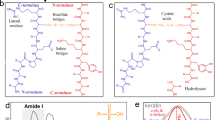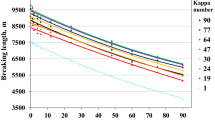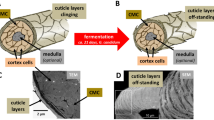Abstract
CHEMISTS are well aware that wool is readily attacked by alkaline reagents. These disrupt the disulphide groups of the cystine contained in the polypeptide chains, thus weakening the fibre structure. The woollen manufacturer also recognizes that wool is susceptible to attack by alkali, as the term ‘alkali damage’ indicates. This damage frequently results from inefficient scouring which afterwards causes the wool to dye unevenly.
This is a preview of subscription content, access via your institution
Access options
Subscribe to this journal
Receive 51 print issues and online access
$199.00 per year
only $3.90 per issue
Buy this article
- Purchase on Springer Link
- Instant access to full article PDF
Prices may be subject to local taxes which are calculated during checkout
Similar content being viewed by others
References
Buntrock, Farber Z., 9, 169 (1898).
Matthews, J. Soc. Chem. Ind., 21, 185 (1902).
Speakman, J. Soc. Chem. Ind., 118, 321 (1929).
Author information
Authors and Affiliations
Rights and permissions
About this article
Cite this article
FRENEY, M., LIPSON, M. Effects of Concentrated Aqueous and certain Non-aqueous Solutions of Alkali upon Wool. Nature 145, 25–26 (1940). https://doi.org/10.1038/145025b0
Issue Date:
DOI: https://doi.org/10.1038/145025b0
Comments
By submitting a comment you agree to abide by our Terms and Community Guidelines. If you find something abusive or that does not comply with our terms or guidelines please flag it as inappropriate.



